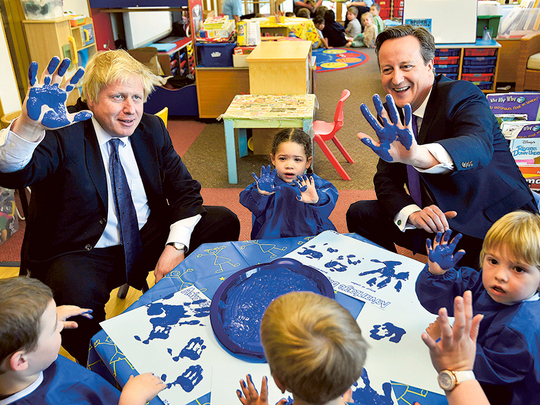
London: People living in Britain’s key swing constituencies have suffered blizzards of leaflets and armies of political canvassers vying for their vote ahead of a knife-edge election on May 7.
“It’s awful really, leaflets come through the door even at nine o’clock at night,” said pensioner Mary Kate Spencer, a resident of Hampstead and Kilburn — the closest fought constituency in England.
“I don’t even bother to read them.”
Interested or not, Hampstead and Kilburn is a prime target for politicians, as the constituency spanning gritty high streets and some of London’s wealthiest areas was won by Labour by just 42 votes in 2010 out of almost 53,000 ballots.
The constituency is a toss-up between the centre-right Conservative party of David Cameron, his junior coalition partners the Liberal Democrats, and the centre-left Labour Party led by Ed Miliband.
Every seat is crucial in a race in which Labour and Conservative have been tied for months, with neither likely to win enough of the 650 constituency seats to form an outright majority.
In Hampstead and Kilburn, the race is a close one between Labour’s Tulip Siddiq — the niece of Bangladesh’s prime minister — and her Conservative challenger Simon Marcus, a retired rugby player.
The candidate for the Liberal Democrats, a party which trailed Labour here by just 841 votes in 2010, is Maajid Nawaz, a former Islamist who now chairs the anti-extremist think tank Quilliam.
Nawaz is thought to be behind his rivals, his campaign hindered by a video that emerged in the press of him receiving a dance in a strip club on what he has said was his stag night.
Nawaz wrote on his Facebook page that the footage was “vindictively leaked to the press” as part of a “a planned and sustained attack campaign”.
Just one road or apartment block can make the difference, and volunteers canvas up and down the streets of marginal constituencies from morning to night.
“The parties are broke, so they only spend their money on marginal constituencies,” said Simon Hix, professor of European and comparative politics at the London School of Economics.
In Hampstead, where party posters are blooming like spring flowers, four leaflets from the Conservative party have been delivered to each house in the last month, according to Conservative political director Oliver Cooper.
“The central party has put together activists from both seats we are pretty sure to win and seats we are pretty sure we are not going to win and put them into constituencies where everything is up for grabs,” Cooper said.
“This allows us to be on the streets more often, to deliver more leaflets, talk to far more voters ... We have knocked on every door in the constituency several times,” he added.
In one year, the Conservatives have flooded the constituency with half a million brochures, aside from leaflets about purely local issues.
Eyston Alexander, 71, who lives off Kilburn High Street, called the leafleting a “total waste”.
“Tories don’t deal with poor people ... they can keep their leaflets,” he said.
Andre Polya, a campaigner for the Labour Party, has also seen his share of disenchantment.
“The reception can be chilly,” he said.
“We use the electoral register and call everyone, primarily the undecideds,” said the Frenchman, who has lived in London for 50 years and whose brick Hampstead house will serve as campaign headquarters on election night.
Like the Conservatives, the Labour Party plans to intensify efforts with the finishing line in sight.
But at least for some, their efforts will be in vain.
“Labour leaflets I tear up directly, and the rest also go directly in the bin,” Spencer said, adding that she intends to vote for a party she has never received a leaflet from.
“I think I will vote Ukip,” she said — the insurgent right-wing UK Independence Party that advocates for fewer immigrants and Britain quitting the European Union.












